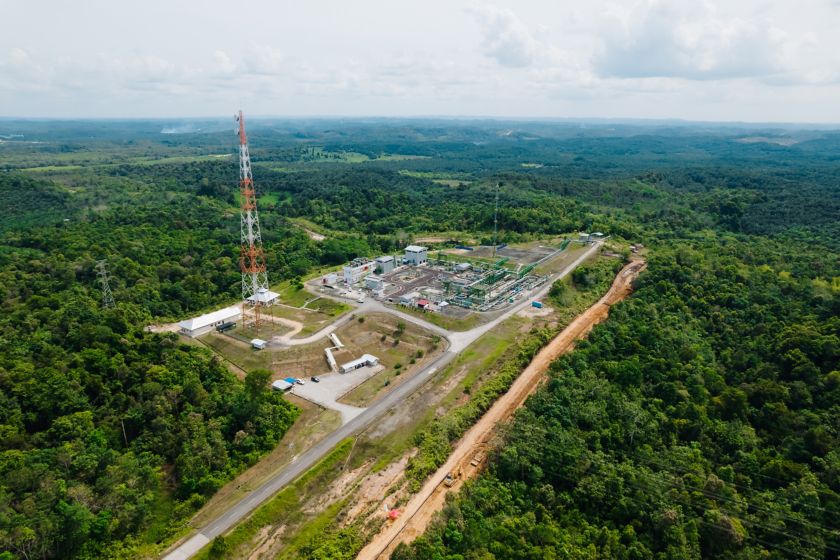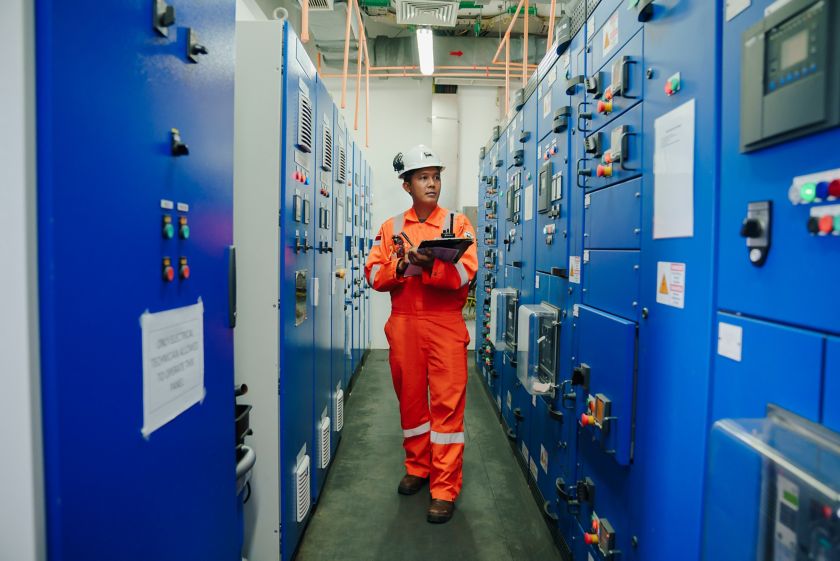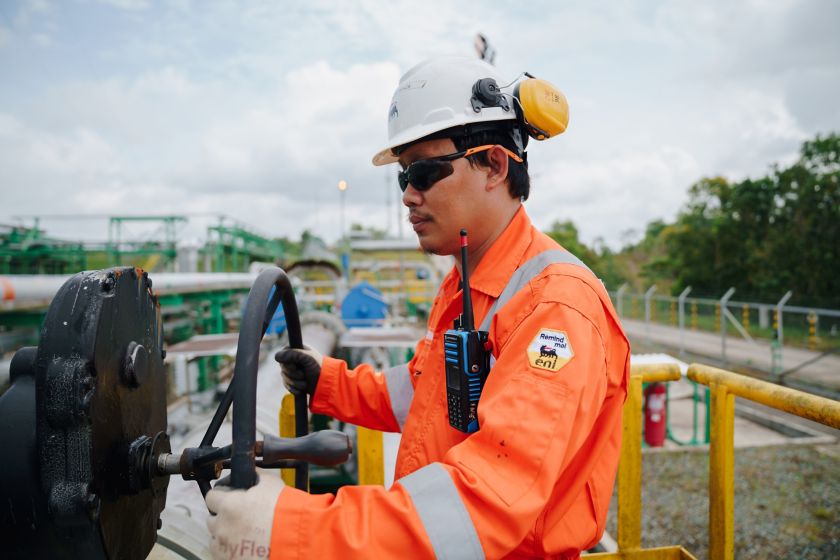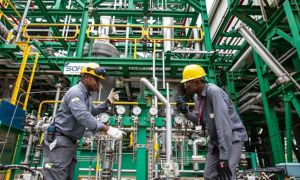Type of activity
Liquid natural gas (LNG)
Oil & Gas

Or , our new artificial intelligence tool.

The Merakes natural gas project, offshore Indonesia, is an example of how we optimise resources to increase efficiency and productivity. The gas extracted from the subsea wells uses the transport infrastructure and processing plants already used for Jankrik, another offshore gas project not far away. Thanks to this interconnection, we were able to start the project quickly and without having to build new facilities.
Both Merakes and Jangkrik are located offshore Indonesia, in a region of great importance for natural gas supplies as it is a crossroads for markets in Asia, the Pacific and the Americas. In addition to natural gas production, we are also present in the country with local development projects we carry out together with institutions and stakeholders, which is an essential aspect of our way of operating.
Luogo: Indonesia
Activity start date: 2018 – present
Merakes is a natural gas project in the Kutei Basin, offshore Indonesia. Gas extracted from subsea wells is processed by the same Floating Production Unit (FPU) that also processes gas from the nearby Jangkrik project. The FPU is operated by Eni and, by optimising the interconnection between the two projects, it achieves a production capacity of 21 million standard cubic metres of gas per day. By using the transport infrastructure already used for Jangkrik, part of Merakes' production is sent to the Onshore Receiving Facility (ORF) in Senipah, from where it reaches the internal market. Another part of the production is processed at the Bontang LNG liquefaction plant, one of the most reliable in the world, which supplies liquefied natural gas (LNG) for both the internal market and for export.

The plant from above

Inside Merakes plant

Merakes plant in Indonesia
daily production capacity of the Merakes project (million standard cubic feet per day)
optimized daily production capacity of the Jangkrik Floating Production Unit (FPU)
An agreement has been signed with Merakes LNG Sellers to increase the availability of liquefied natural gas at the Bontang facility and strengthen our LNG portfolio.
The Merakes project starts producing natural gas.
The Merakes development investment plan has been approved.
Announced new gas discovery in Merakes East. .
The project’s development plan is approved.
The first appraisal well is drilled successfully.

If you want to change topic, clear the chat and make a new query to receive more relevant results.
This will delete the question history.
If you want to change topic, clear the chat and make a new query to receive more relevant results. This will delete the question history.
Here you can find the full list of your queries.
The answers are generated by artificial intelligence, therefore they may contain inaccuracies. Please read the terms and conditions of use.

EnergIA is an innovative tool based on artificial intelligence capabilities, which can help you navigate the contents of eni.com, quickly finding answers to your questions. EnergIA can also perform a search on a specific topic, providing the most up-to-date data available, or it can invite you to delve deeper into a topic of your interest by suggesting links and specific readings. Start now!
EnergIA is an innovative tool based on artificial intelligence capabilities, which can help you navigate the contents of eni.com, quickly finding answers to your questions. Start now!
EnergIA (ener'dʒia) is a system based on Generative Artificial Intelligence.
Thanks to this technology, we can respond to your requests by querying the most relevant content and documents available on eni.com. (Note: financial documents from the last 12 months and press releases from the last 2 years are considered.)
Through EnergIA, you can delve into topics of interest and have a real-time window into the world of Eni.
If you wish to search for a specific document, press release or news, use the traditional search engine via the magnifying glass icon.
Like all systems that leverage Generative Artificial Intelligence, EnergIA may generate inaccurate or outdated responses. Always consult the sources that EnergIA proposes as the origin of the generated information.
If the system fails to find an exact match for the requested content, it still tends to provide a response.
If you find any inaccuracies in the provided response, please send us your feedback at the bottom of the page: it will be very helpful for us to improve.
Remember that the content generated by the system does not represent Eni’s official position. We therefore invite stakeholders to refer to their designated contacts for official statements: Press Office for journalists, Investor Relations for analysts and investors, Company Secretariat for shareholders etc..
EnergIA can understand questions posed in almost all languages, but we prefer to provide you with a response in English or Italian, the two languages available on eni.com. If you ask a question in Italian, the content on the site in Italian will be consulted. If you ask it in English or any other language, the content in English will be consulted. (Note: the language Eni uses for financial documents/content is predominantly English.)
If questions are formulated that violate the set security criteria, the system will not proceed with processing the response. Please remember not to send personal data.
By using this service, the users acknowledge that they have read and accepted the terms and conditions of use.
Search
EnergIA (ener'dʒia) is a system based on Generative Artificial Intelligence.
Thanks to this technology, we can respond to your requests by querying the most relevant content and documents available on eni.com. (Note: financial documents from the last 12 months and press releases from the last 2 years are considered.)
Through EnergIA, you can delve into topics of interest and have a real-time window into the world of Eni.
If you wish to search for a specific document, press release or news, use the traditional search engine via the magnifying glass icon.
Like all systems that leverage Generative Artificial Intelligence, EnergIA may generate inaccurate or outdated responses. Always consult the sources that EnergIA proposes as the origin of the generated information.
If the system fails to find an exact match for the requested content, it still tends to provide a response.
If you find any inaccuracies in the provided response, please send us your feedback at the bottom of the page: it will be very helpful for us to improve.
Remember that the content generated by the system does not represent Eni’s official position. We therefore invite stakeholders to refer to their designated contacts for official statements: Press Office for journalists, Investor Relations for analysts and investors, Company Secretariat for shareholders etc..
EnergIA can understand questions posed in almost all languages, but we prefer to provide you with a response in English or Italian, the two languages available on eni.com. If you ask a question in Italian, the content on the site in Italian will be consulted. If you ask it in English or any other language, the content in English will be consulted. (Note: the language Eni uses for financial documents/content is predominantly English.)
If questions are formulated that violate the set security criteria, the system will not proceed with processing the response. Please remember not to send personal data.
By using this service, the users acknowledge that they have read and accepted the terms and conditions of use.
A new window into Eni’s world, at your disposal. EnergIA is an innovative tool based on artificial intelligence capabilities, which can help you navigate the contents of eni.com, quickly finding answers to your questions.
